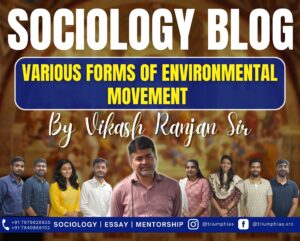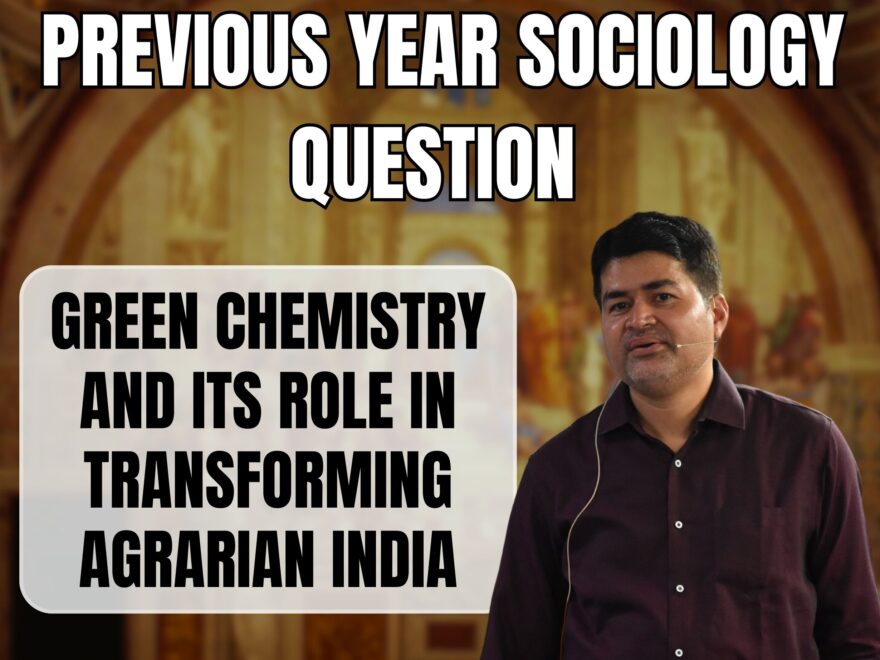Point Out Benefits of Green Chemistry in Agrarian Transformation in India.
(Paper: 2, Section- B, Year 2020, Unit 13: Social Changes in India)

Point out Benefits of Green Chemistry in Agrarian Transformation in India.
(10 Marks)
| Introduction: Brief About Green Chemistry
Main Body: Benefits of Green Chemistry Agrarian Transformation in India, Challenges Associated with Adoption of Green Chemistry Conclusion: Harnessing Potential of Green Chemistry |
Introduction
Green chemistry, also known as sustainable chemistry, is an approach that focuses on designing chemical processes and products in a way that reduces their environmental impact, minimizes the use and generation of hazardous substances, and promotes sustainability. It aims to create safer and more efficient chemical processes while considering the health of humans and the environment.
Main Body
Green Chemistry Offers Several Benefits for Agrarian Transformation in India:
- Resource Efficiency: Green chemistry techniques optimize resource utilization, minimizing wastage and conserving valuable resources like water and energy. This efficiency enhances the productivity of agricultural processes, contributing to higher yields and improved livelihoods for farmers. It can solve the issue of rising anomic farmer suicide.
- Sustainable Agriculture: Green chemistry promotes the development of eco-friendly agrochemicals and fertilizers that minimize environmental harm. This ensures sustainable agricultural practices by reducing soil and water pollution, preserving biodiversity, and safeguarding the health of farmers and consumers. It can prevent the marginalization of agriculture as a vocation and hence forced migration to urban areas can be stopped.
- Reduced Environmental Impact: Adoption of green chemistry in agriculture results in reduced chemical residues in soil, water, and food products. This contributes to healthier ecosystems, improved soil fertility, and safer food consumption for the population. It can help in solving the issue of green revolution areas becoming Cancer Capital in future.
- Biodiversity Preservation: Green chemistry encourages the use of biologically derived compounds and natural extracts for pest and disease management. This reduces the reliance on synthetic chemicals that can harm beneficial organisms and supports the conservation of local It helps in safeguarding interests of tribal people. Also green chemistry with its innovations would help us to move out of wheat rice system which was result of green revolution as ASHOK RUDRA calls it.
- Climate Resilience: Eco-friendly agricultural practices aligned with green chemistry principles contribute to climate resilience. Reduced chemical usage and improved land management help mitigate greenhouse gas emissions and adapt to changing climate patterns. It can help in mitigating the contribution of agriculture towards risk society.
- Empowerment of Farmers: By reducing chemical dependency and promoting organic farming methods, green chemistry empowers farmers with knowledge and skills to manage their resources more effectively. This enhances their decision-making abilities and self-sufficiency. It will increase their bargaining power and reducing their marginalization.
- Ease of living for women farmer: feminization of agriculture has created many issues for women like non availability of technology and inputs which are handy or easy to use for women. Green chemistry solutions like nano urea can help solve such issues.
- Economic Viability: Green chemistry approaches promote the development of cost-effective and locally sourced inputs. This enhances the economic sustainability of small-scale farmers by reducing production costs and dependency on expensive chemical inputs. It can convert the Indian agriculture into profitable capitalistic venture from present state where Indian agrarian class structure is predominately having feudalistic features like indebtedness, low use of tech, low productivity ,etc. as highlighted by Dhanagre.
- Improved Food Security: Sustainable agricultural practices resulting from green chemistry implementation contribute to enhanced food security. Higher yields, reduced post-harvest losses, and improved soil health help meet the growing demand for food in a resource-efficient manner. It can help in solving growing challenges of malnutrition, efficient utilisation of demographic dividend.
Challenges Associated with Adoption of Green Chemistry:
-
- Cultural Lag: Societal norms and cultural practices often resist change. The adoption of green technology requires altering established behaviours and practices, which can be met with scepticism and resistance due to familiarity and tradition. There can be lack in adaptive capability among the framers due to cultural lag.
- Social inequality: Green technology adoption might require initial investments that some individuals or communities cannot afford. Societal inequalities can hinder equitable access to sustainable alternatives, exacerbating disparities. Social exclusion and relative deprivation to economic inequality can create anomie and alienation.
- Institutional Barriers: Existing institutions and regulations might not align with the principles of green chemistry. Bureaucratic hurdles created by legal ration authority can slow down the implementation of new technologies, discouraging their adoption.
- Risk Perception: Societal perceptions of risk associated with new technologies can influence their adoption. If green chemistry solutions are perceived as risky or untested, resistance might arise.it may not mobilise collective consciousness.
- Education and Awareness: Lack of awareness about green chemistry and its benefits can hinder adoption. Societal awareness campaigns and educational initiatives are crucial to change mind-sets and behaviours. This would require creation of information capital.
Conclusion
The integration of green chemistry principles in India’s agrarian transformation holds immense promise. It can revolutionize resource utilization, enhance sustainable practices, mitigate environmental impact, empower farmers, and ensure food security. However, challenges such as cultural inertia, economic constraints, and institutional barriers must be navigated. Efforts to raise awareness, address inequalities, and align policies are essential for realizing the full potential of green chemistry in shaping a resilient, equitable, and prosperous agrarian landscape for India.
Related Blogs …
 |
 |

To master these intricacies and fare well in the Sociology Optional Syllabus, aspiring sociologists might benefit from guidance by the Best Sociology Optional Teacher and participation in the Best Sociology Optional Coaching. These avenues provide comprehensive assistance, ensuring a solid understanding of sociology’s diverse methodologies and techniques.
META TAGS:
Green Chemistry, Agrarian Transformation, India, Sustainable Agriculture, Resource Efficiency, Environmental Impact, Biodiversity Preservation, Climate Resilience, Economic Viability, Food Security, Cultural Lag, Social Inequality, Institutional Barriers, Risk Perception, Community Development programme, programmes of rural development, cooperatives, poverty alleviation schemes, Green revolution and social change, Changing modes of production in India agriculture, problems of rural labour, bondage, migration
Why Vikash Ranjan’s Classes for Sociology?
Proper guidance and assistance are required to learn the skill of interlinking current happenings with the conventional topics. VIKASH RANJAN SIR at TRIUMPH IAS guides students according to the Recent Trends of UPSC, making him the Best Sociology Teacher for Sociology Optional UPSC.
At Triumph IAS, the Best Sociology Optional Coaching platform, we not only provide the best study material and applied classes for Sociology for IAS but also conduct regular assignments and class tests to assess candidates’ writing skills and understanding of the subject.
Choose The Best Sociology Optional Teacher for IAS Preparation?
At the beginning of the journey for Civil Services Examination preparation, many students face a pivotal decision – selecting their optional subject. Questions such as “which optional subject is the best?” and “which optional subject is the most scoring?” frequently come to mind. Choosing the right optional subject, like choosing the best sociology optional teacher, is a subjective yet vital step that requires a thoughtful decision based on facts. A misstep in this crucial decision can indeed prove disastrous.
Ever since the exam pattern was revamped in 2013, the UPSC has eliminated the need for a second optional subject. Now, candidates have to choose only one optional subject for the UPSC Mains, which has two papers of 250 marks each. One of the compelling choices for many has been the sociology optional. However, it’s strongly advised to decide on your optional subject for mains well ahead of time to get sufficient time to complete the syllabus. After all, most students score similarly in General Studies Papers; it’s the score in the optional subject & essay that contributes significantly to the final selection.
“A sound strategy does not rely solely on the popular
Opinion of toppers or famous YouTubers cum teachers.”
It requires understanding one’s ability, interest, and the relevance of the subject, not just for the exam but also for life in general. Hence, when selecting the best sociology teacher, one must consider the usefulness of sociology optional coaching in General Studies, Essay, and Personality Test.
The choice of the optional subject should be based on objective criteria, such as the nature, scope, and size of the syllabus, uniformity and stability in the question pattern, relevance of the syllabic content in daily life in society, and the availability of study material and guidance. For example, choosing the best sociology optional coaching can ensure access to top-quality study materials and experienced teachers. Always remember, the approach of the UPSC optional subject differs from your academic studies of subjects. Therefore, before settling for sociology optional, you need to analyze the syllabus, previous years’ pattern, subject requirements (be it ideal, visionary, numerical, conceptual theoretical), and your comfort level with the subject.
This decision marks a critical point in your UPSC – CSE journey, potentially determining your success in a career in IAS/Civil Services. Therefore, it’s crucial to choose wisely, whether it’s the optional subject or the best sociology optional teacher. Always base your decision on accurate facts, and never let your emotional biases guide your choices. After all, the search for the best sociology optional coaching is about finding the perfect fit for your unique academic needs and aspirations.
Follow us :
🔎 https://www.instagram.com/triumphias
🔎https://www.youtube.com/c/TriumphIAS
https://t.me/VikashRanjanSociology
Find More Blogs
|
Scope of the subject and comparison with other social sciences |
|||
|
|
|
|
Modernity and social changes in Europe |


2 comments